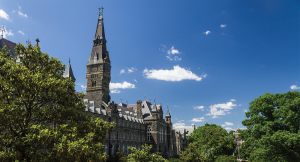Following the federal detainment of Georgetown University postdoctoral researcher Badar Khan Suri, several university organizations expressed their concerns over academic freedom and on-campus expression.
U.S. Department of Homeland Security (DHS) agents arrested Khan Suri, an Indian citizen residing in the United States legally on a J-1 non-immigrant visa for researchers, March 17, alleging his presence threatens U.S. foreign policy. While at Georgetown, Khan Suri, a researcher at Georgetown’s Alwaleed Center for Muslim-Christian Understanding (ACMCU), had been working on projects related to peace and religious tension while teaching a course on majoritarian ideologies and minority rights in South Asia.
The ACMCU said in a March 20 statement that Khan Suri’s arrest was a political move to attack academic freedom.
“Dr. Khan Suri has committed no crime,” the ACMCU wrote. “Like Mahmoud Khalil before him, he was arrested in the context of a campaign by the Trump Administration to destroy higher education in the United States and punish their political opponents.”

The Georgetown University College Democrats (GUCD) said in a March 20 statement that the Georgetown community must defend Khan Suri’s rights.
“The Georgetown University College Democrats stand in solidarity with Badar Khan Suri and reaffirm our commitment to the fundamental principles of free speech and due process,” GUCD wrote in the statement.
“As a University community, we must uphold the rights of individuals to express dissenting opinions and engage in open dialogue, especially when it challenges dominant narratives,” GUCD added. “Regardless of whether you agree or disagree with Dr. Khan Suri’s views, his unlawful detention should engage each and every one of us. An attack on one Hoya is an attack on us all.”
The detainment, which coincides with greater crackdowns on pro-Palestinian activism by the administration of President Donald Trump, sparked concerns about free speech rights on college campuses. It comes less than two weeks after the March 8 detention of Mahmoud Khalil, a Columbia University student activist and legal U.S. permanent resident who led protests at Columbia against the Israel-Hamas war and whose detention Georgetown community members protested March 11.
In a statement, DHS Assistant Secretary for Public Affairs Tricia McLaughlin said Khan Suri was detained because of his social media activity and familial connections. Khan Suri’s father-in-law, Ahmed Yousef, formerly served as an official in Gaza’s Hamas-run government yet left his position over a decade ago and publicly criticized Hamas’ Oct. 7, 2023, attack on Israel, according to The New York Times. Yousef told the New York Times that Khan Suri is not involved in any “political activism” for Hamas.
“Suri was a foreign exchange student at Georgetown University actively spreading Hamas propaganda and promoting antisemitism on social media,” McLaughlin wrote. “Suri has close connections to a known or suspected terrorist, who is a senior advisor to Hamas.”
Nico Cefalu (CAS ’27), the president of Georgetown’s chapter of the American Civil Liberties Union (ACLU), said detaining Khan Suri over his social media posts runs counter to the American right of free political speech.
“I think it’s pretty obvious that this is just blatantly targeting someone for their political beliefs,” Cefalu told The Hoya. “It’s not fair. Trump shouldn’t be allowed to weaponize educational visas to censor people for what they think.”
School of Foreign Service Dean Joel Hellman wrote in an email to faculty March 19 that Khan Suri’s detainment is antithetical to Georgetown’s commitment to academic freedom.
“As an individual, I am deeply concerned for the welfare of our colleague and his family,” Hellman wrote in the email. “As Dean, I am deeply troubled by the chilling effect such events could have on freedom of expression on this campus, which is, of course, at the very core of our mission.”
“Our commitment to fostering open inquiry, deliberation and debate has not always made for a comfortable campus, but I believe that time has shown that it has played a key role in maintaining our University values,” Hellman wrote.
Cefalu said Khan Suri’s beliefs on the conflict in the Middle East should not affect his immigration status.
“Regardless of what you think about Israel-Palestine stuff, it would be wrong to deport or attempt to deport someone for their beliefs on Israel on either side,” Cefalu added. “It’s just reprehensible. It’s not what we’re supposed to do in this country.”
The ACMCU said Khan Suri’s arrest is part of a broader trend of attacks on free speech and called on the Georgetown community to speak out against them.
“American citizens need to mobilize and resist the authoritarian takeover of our country. First, they came for Mahmoud Khalil and Badar Khan Suri,” the ACMCU wrote. “Their ‘crime’ is defending Palestinian human rights. Do you think the Trump Administration will stop there?”